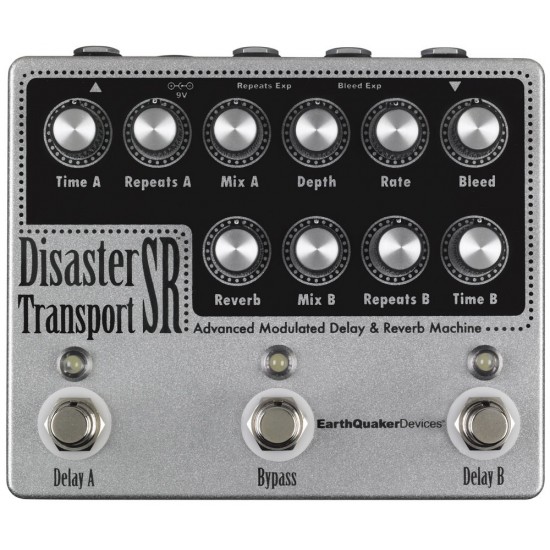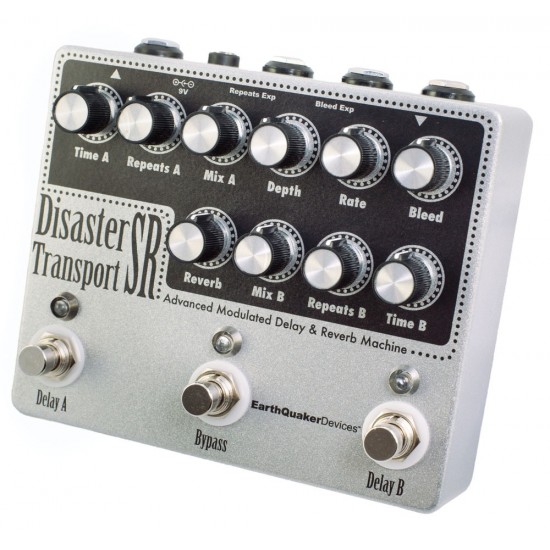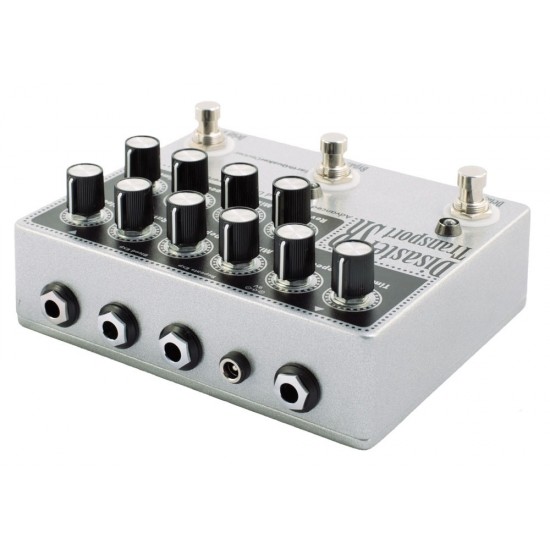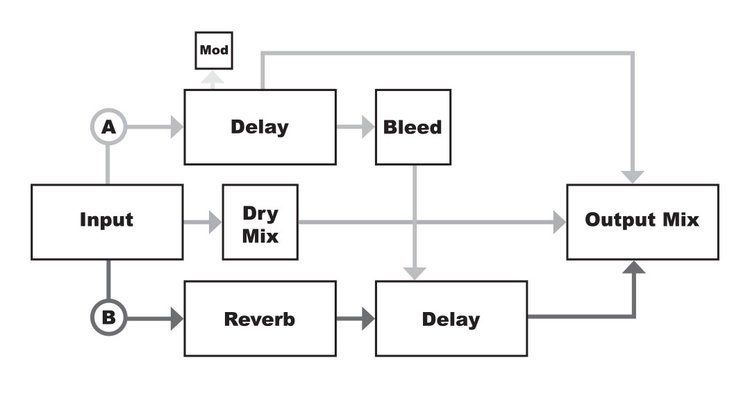





- Stock: In Stock
The Disaster Transport SR is a dual delay with reverb and modulation. It was designed from the ground up to create an intense wash of lo-fi swirling tape styled echo. While it may look intimidating at first glance, it’s actually pretty easy to navigate. The top row of controls are for delay A and the bottom row of controls are for delay B. Delay A is a 600ms delay with modulation and delay B is a 300ms delay with reverb. Both delays can be run separately, in parallel, in series or in series/parallel. To take it one step further, there are also expression controls for the repeats on delay A as well as bleeding delay A into delay B. The switching was designed so each delay can be used individually or in tandem with both true bypass or trails.
In addition to being used as a straight delay, straight reverb, rhythmic delay, modulated delay and old school tape-style echo, the Disaster Transport SR can also be used to create a wide variety of wild sounds ranging from warped records, clanging flange, smooth chorus, echoed out squalls and various other-worldly effects that will blow your mind, man. If you are a fan of old school tape delay and crazy lo-fi sounds, you will get hours of enjoyment every time you plug into the Disaster Transport SR.
Controls
Delay A Controls
Time: Controls the delay time from about 30ms up to 600ms.
Repeats: Controls how many regenerations of the signal there are. This ranges from one single repeat through an endless wash into self oscillation. This can also be controlled via an expression pedal. The Moog EP-2 is recommended.
Mix: Level control for the wet signal. Unity is around center, anything above is boosted. Boosting this works great when using a distorted signal. Please keep in mind this is a gain control, a bit of hiss is normal when it’s above unity.
Depth: Controls the intensity of the modulation, from no modulation to all out seasick pitch bends.
Rate: Controls the rate of the modulation. The LED for delay A flashes in time with the modulation to visually show where the rate is set.
Bleed: This feeds delay A into delay B, post reverb (see block diagram for visual explanation). Use this control for series or series/parallel operation to create rhythmic repeats, extra long delay time or an all out echo wash. This can also be controlled via an expression pedal. The Moog EP-2 is recommended. When using the bleed, experiment with the repeat controls on each delay line. Try using them in different settings, both together and individually, for different timing and textures.
Delay B Controls
Reverb: Controls the amount of reverb added to the input of delay B.
Mix: Level control for the wet signal. Unity is around center, anything above is boosted. Boosting this works great when using a distorted signal. Please keep in mind this is a gain control, a bit of hiss is normal when it’s above unity.
Repeats: Controls how many regenerations of the signal there are. This ranges from one single repeat through an endless wash into self oscillation.
Time: Controls the delay time from about 30ms up to 300ms.
Switching
The switches for both delays switch the inputs only. The outputs are always connected. This allows you to have trails by always leaving the bypass switch engaged or to use the bypass switch as the master on/off for true bypass. Additionally, you can feed delay A in to delay B with the bleed control without having delay B switched on for a cleaner rhythmic delay.

Signal Flow & Notes

Signal Path Block Diagram Explanation: Delay A and B levels can be adjusted with the Mix control. Dry signal is always present at unity level. The Bleed control is used to feed the output of delay A into the input of delay B. If the Bleed control is set anywhere above zero, you will hear the output of delay B being fed by delay A, regardless if delay B is switched on or off.
Series Operation: Delay A is switched on and set to taste, Delay B is switched off and set to taste and the Bleed control set to taste.
Parallel Operation: Delay A is switched on and set to taste, Delay B is switched on and set to taste and the Bleed control is set to zero (no bleed).
Series/Parallel Operation: Delay A is switched on and set to taste, Delay B is switched on and set to taste and the Bleed control set to taste.
Delay A only: Delay A is switched on and set to taste, the Bleed is set at zero and Delay B is switched off.
Delay B only: Delay A is switched off, the Bleed is set at zero and Delay B is switched on and set to taste.
Specs:
Dimensions: 4.75 x 5.65 x 2.25 in. (121 x 144 x 57 mm) with knobs
Current Draw: 107 mA
Input Impedance: 500 kΩ
Output Impedance: <1 kΩ
Power:
This device takes a standard 9 volt DC power supply with a 2.1mm negative center barrel. We always recommend pedal-specific, transformer-isolated wall-wart power supplies or multiple isolated-output supplies. Pedals will make extra noise if there is ripple or unclean power. Switching-type power supplies, daisy chains and non-pedal specific power supplies do not filter dirty power as well and let through unwanted noise. DO NOT RUN AT HIGHER VOLTAGES!
DOWNLOAD MANUAL HERE
WATCH THE DEMO HERE






